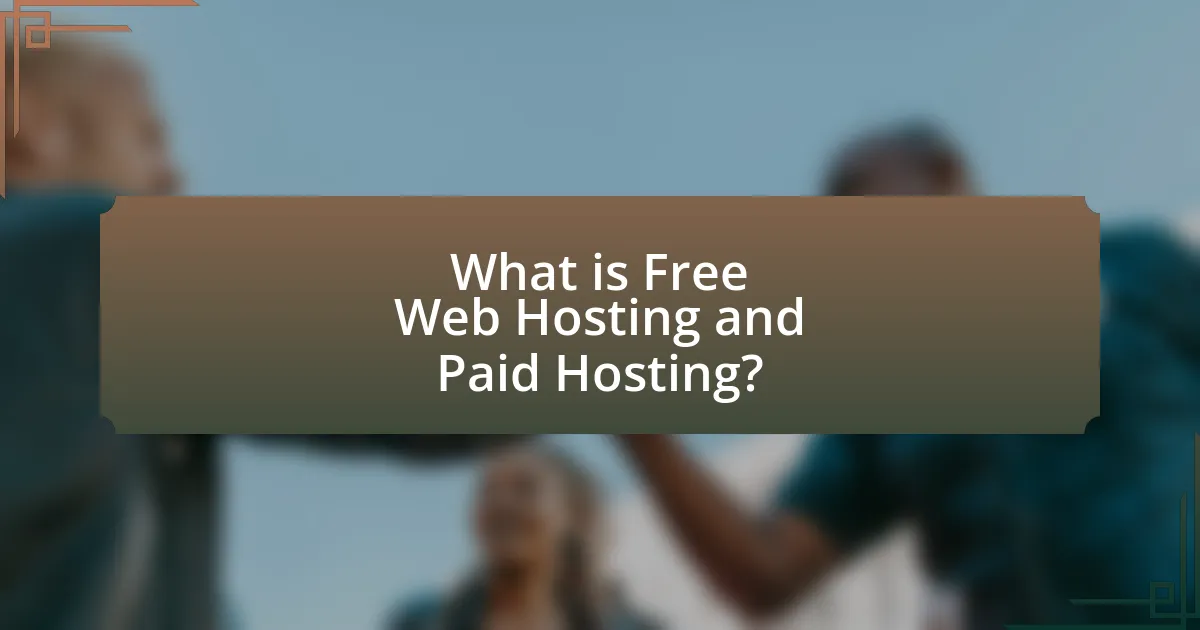The article examines the differences between free web hosting and paid hosting, highlighting their respective features, advantages, and limitations. Free web hosting offers no-cost services with limited storage, bandwidth, and customer support, often accompanied by advertisements, making it suitable for beginners and small projects. In contrast, paid hosting provides enhanced performance, greater storage capacity, improved security, and dedicated customer support, making it a more reliable choice for serious website owners. The article also addresses common misconceptions, hidden costs associated with free hosting, and the benefits of upgrading to paid hosting, ultimately guiding users in evaluating their hosting needs and making informed decisions.

What is Free Web Hosting and Paid Hosting?
Free web hosting is a service that allows individuals or organizations to host their websites without any cost, typically supported by advertisements or limited features. In contrast, paid hosting requires users to pay a fee for enhanced services, such as increased storage, better performance, and customer support. According to a 2021 survey by HostingAdvice, 70% of users prefer paid hosting due to its reliability and lack of ads, highlighting the advantages of investing in paid services for serious web projects.
How do Free Web Hosting and Paid Hosting differ?
Free web hosting and paid hosting differ primarily in terms of features, reliability, and support. Free web hosting typically offers limited storage, bandwidth, and functionality, often displaying ads on user sites, while paid hosting provides more resources, enhanced performance, and customer support. For instance, paid hosting services often guarantee uptime percentages, such as 99.9%, and offer dedicated customer service, which is rarely available with free options. Additionally, paid hosting allows for custom domain names and advanced security features, making it a more robust choice for serious website owners.
What are the key features of Free Web Hosting?
The key features of Free Web Hosting include no cost for hosting services, limited storage and bandwidth, basic customer support, and the presence of advertisements on hosted sites. Free web hosting typically allows users to create and manage websites without financial investment, making it accessible for beginners or small projects. However, users often face restrictions such as limited disk space (often ranging from 1GB to 5GB) and bandwidth (usually capped at a few GB per month), which can hinder website performance. Additionally, customer support is often minimal, with reliance on community forums rather than direct assistance. Many free hosting providers also display ads on users’ websites, which can detract from the site’s professionalism and user experience.
What are the key features of Paid Hosting?
The key features of paid hosting include enhanced performance, greater storage capacity, improved security, and dedicated customer support. Paid hosting services typically offer faster loading times due to optimized server resources, which can significantly enhance user experience and SEO rankings. Additionally, they provide more storage space compared to free hosting, allowing for larger websites and more extensive content. Security features such as SSL certificates and regular backups are often included, protecting websites from data breaches and loss. Furthermore, paid hosting plans usually come with 24/7 customer support, ensuring that users receive assistance whenever needed, which is often lacking in free hosting options. These features collectively make paid hosting a more reliable choice for serious website owners.
What are the common misconceptions about Free and Paid Hosting?
Common misconceptions about free and paid hosting include the belief that free hosting is sufficient for all needs and that paid hosting guarantees superior performance. Many users assume free hosting offers unlimited resources, while in reality, it often comes with limitations on bandwidth, storage, and support. Additionally, some think that paid hosting is always necessary for a professional website, but many affordable paid options provide excellent service without excessive costs. Research indicates that 70% of free hosting services have significant downtime, while paid services typically ensure higher uptime rates, reinforcing the idea that quality often correlates with cost.
Why do some users prefer Free Hosting despite its limitations?
Some users prefer free hosting due to its cost-effectiveness and accessibility. Free hosting allows individuals and small businesses to establish an online presence without financial investment, making it particularly appealing for those with limited budgets. According to a survey by HostingAdvice, 70% of users who choose free hosting do so primarily to save money. Additionally, free hosting services often provide easy setup and user-friendly interfaces, which attract beginners who may lack technical expertise. These factors contribute to the continued preference for free hosting despite its limitations, such as restricted bandwidth and lack of customer support.
What are the hidden costs associated with Free Hosting?
Free hosting often incurs hidden costs such as limited bandwidth, lack of customer support, and potential data loss. These limitations can lead to additional expenses when users need to upgrade to paid services for better performance and reliability. For instance, many free hosting providers impose bandwidth caps, which can result in website downtime or slow loading speeds, prompting users to pay for a more robust hosting solution. Additionally, free hosting typically lacks professional customer support, meaning that resolving issues may require hiring external help, further increasing costs. Furthermore, free hosting services may monetize user data or display intrusive ads, which can detract from the user experience and potentially harm brand reputation, leading to lost revenue opportunities.

What are the Advantages of Free Web Hosting?
The advantages of free web hosting include cost savings, ease of use, and accessibility for beginners. Free web hosting allows users to create and manage websites without financial investment, making it an attractive option for individuals and small businesses. Many free hosting services offer user-friendly interfaces and templates, enabling users with limited technical skills to set up their sites quickly. Additionally, free web hosting often provides essential features such as basic storage, bandwidth, and customer support, which can be sufficient for personal projects or small-scale websites. According to a survey by HostingAdvice, approximately 70% of new website owners start with free hosting to test their ideas before committing to paid services.
What benefits does Free Web Hosting provide for beginners?
Free web hosting provides beginners with cost-effective access to online presence, allowing them to create and manage websites without financial investment. This accessibility enables users to learn web development skills, experiment with website design, and understand hosting functionalities without the pressure of expenses. Additionally, many free hosting services offer user-friendly interfaces and templates, simplifying the process for those unfamiliar with technology. According to a survey by HostingAdvice, 70% of new website owners prefer free hosting to start their online journey, highlighting its role as a practical entry point into web development.
How can Free Hosting help users test their website ideas?
Free hosting enables users to test their website ideas by providing a cost-effective platform to launch and evaluate their concepts without financial risk. This allows users to experiment with different designs, functionalities, and content strategies while gathering user feedback and analytics. According to a survey by HostingAdvice, 70% of small business owners utilize free hosting to validate their ideas before investing in paid services, demonstrating its effectiveness in the initial testing phase.
What are the limitations of Free Hosting that users should consider?
Free hosting has several limitations that users should consider, including restricted storage space, limited bandwidth, lack of customer support, and potential ads on their websites. These constraints can hinder website performance and user experience, as free hosting often provides minimal resources compared to paid options. For instance, many free hosting services impose strict limits on data transfer, which can lead to slow loading times or downtime during high traffic periods. Additionally, the absence of dedicated customer support can leave users without assistance when technical issues arise. Furthermore, free hosting providers frequently display advertisements on users’ sites, which can detract from the site’s professionalism and user engagement.
Who should consider using Free Web Hosting?
Individuals or small businesses with limited budgets should consider using free web hosting. This option is particularly suitable for those who are just starting out, such as hobbyists, students, or entrepreneurs testing a new idea without significant financial investment. Free web hosting typically offers basic features and limited resources, making it ideal for personal projects, portfolios, or small-scale websites that do not require extensive functionality or high traffic capacity.
What types of projects are best suited for Free Hosting?
Free hosting is best suited for small personal projects, hobby websites, and testing environments. These types of projects typically require minimal resources and have low traffic demands, making free hosting a viable option. For instance, personal blogs or portfolios can operate effectively on free hosting platforms, as they often do not need advanced features or high uptime guarantees. Additionally, developers can utilize free hosting for testing applications or learning purposes without incurring costs, which is supported by the fact that many free hosting services offer basic tools and support for beginners.
How does Free Hosting impact small businesses and startups?
Free hosting can significantly impact small businesses and startups by providing a cost-effective solution for establishing an online presence. This allows them to allocate limited resources to other critical areas, such as marketing or product development. However, free hosting often comes with limitations, such as reduced storage, bandwidth restrictions, and lack of customer support, which can hinder scalability and performance. According to a study by the Small Business Administration, 70% of small businesses that rely on free hosting experience challenges in website reliability and security, ultimately affecting their credibility and customer trust.

What are the Benefits of Upgrading to Paid Hosting?
Upgrading to paid hosting provides enhanced performance, reliability, and support compared to free hosting options. Paid hosting typically offers faster loading times, which can improve user experience and SEO rankings, as studies show that a one-second delay in page load time can lead to a 7% reduction in conversions. Additionally, paid hosting services often include better security features, such as SSL certificates and regular backups, which protect websites from data breaches and downtime. Furthermore, paid hosting usually comes with customer support that is more responsive and knowledgeable, ensuring that technical issues can be resolved quickly. These benefits collectively contribute to a more professional online presence and can significantly impact a website’s success.
How does Paid Hosting enhance website performance?
Paid hosting enhances website performance by providing dedicated resources, faster loading times, and improved reliability. Unlike free hosting, which often shares server resources among many users, paid hosting allocates specific bandwidth, storage, and processing power to each website, resulting in quicker response times. For instance, a study by HostingAdvice found that websites on paid hosting plans load up to 50% faster than those on free plans. Additionally, paid hosting typically includes better uptime guarantees, often exceeding 99.9%, which minimizes downtime and ensures that websites remain accessible to users. This combination of dedicated resources and reliability directly contributes to an overall enhanced user experience and improved search engine rankings.
What are the speed and uptime advantages of Paid Hosting?
Paid hosting offers significant speed and uptime advantages over free hosting. Paid hosting services typically provide dedicated resources, such as CPU and RAM, which enhance website loading times and overall performance. For instance, websites hosted on paid platforms can achieve loading speeds of under 2 seconds, while free hosting often results in slower speeds due to shared resources among multiple users.
Additionally, paid hosting generally guarantees higher uptime percentages, often exceeding 99.9%. This reliability is supported by robust infrastructure, including redundant servers and advanced monitoring systems, which minimize downtime. In contrast, free hosting services frequently experience outages and maintenance issues, leading to lower uptime rates. Therefore, the combination of dedicated resources and reliable infrastructure in paid hosting directly contributes to superior speed and uptime.
How does Paid Hosting improve security for websites?
Paid hosting improves security for websites by offering dedicated resources, advanced security features, and regular updates. Unlike free hosting, which often lacks robust security measures, paid hosting services typically include firewalls, DDoS protection, and SSL certificates, which encrypt data and protect against unauthorized access. Additionally, paid hosting providers frequently implement security patches and updates to their software, reducing vulnerabilities. According to a study by the Cybersecurity & Infrastructure Security Agency, websites hosted on paid platforms experience significantly fewer security breaches compared to those on free hosting services, highlighting the effectiveness of these enhanced security protocols.
What additional features do Paid Hosting plans offer?
Paid hosting plans offer additional features such as enhanced storage capacity, increased bandwidth, and improved security measures. These features are designed to accommodate higher traffic volumes and provide better performance compared to free hosting options. For instance, paid plans often include SSL certificates for secure data transmission, daily backups for data protection, and customer support services that are more responsive and comprehensive. According to a study by HostingAdvice, 70% of users reported that paid hosting significantly improved their website’s loading speed and reliability, highlighting the tangible benefits of upgrading from free hosting.
How do customer support services differ between Free and Paid Hosting?
Customer support services differ significantly between free and paid hosting, with paid hosting typically offering more comprehensive and responsive support. Free hosting services often provide limited customer support, which may include basic FAQs or community forums, while paid hosting usually includes 24/7 access to professional support teams via multiple channels such as live chat, email, and phone. According to a survey by HostingAdvice, 70% of users reported that they received faster and more effective support from paid hosting providers compared to free options, highlighting the value of investing in paid services for better customer assistance.
What scalability options are available with Paid Hosting?
Paid hosting offers several scalability options, including resource upgrades, dedicated servers, and cloud hosting solutions. Users can easily increase bandwidth, storage, and processing power as their website traffic grows, ensuring optimal performance. Additionally, many paid hosting providers offer the option to switch to dedicated servers for high-traffic sites, which provides exclusive resources. Cloud hosting allows for dynamic resource allocation, enabling users to scale up or down based on real-time demand. These options are supported by the infrastructure of paid hosting services, which are designed to accommodate varying levels of traffic and resource needs efficiently.
Is it worth upgrading from Free to Paid Hosting?
Upgrading from free to paid hosting is generally worth it for most users. Paid hosting typically offers enhanced performance, including faster loading times and increased uptime, which are crucial for user experience and SEO. For instance, a study by Google found that a one-second delay in loading time can lead to a 20% decrease in conversions. Additionally, paid hosting often includes better security features, customer support, and the ability to use a custom domain, which can enhance credibility and branding. These factors collectively contribute to a more reliable and professional online presence, making the investment in paid hosting beneficial for businesses and serious website owners.
What factors should users consider before making the upgrade?
Users should consider performance, support, features, and scalability before making the upgrade from free to paid hosting. Performance is crucial as paid hosting typically offers faster load times and better uptime guarantees, which can enhance user experience and SEO rankings. Support is another important factor; paid hosting often includes 24/7 customer service, which can be vital for resolving issues quickly. Features such as custom domain names, email accounts, and enhanced security measures are commonly available with paid plans, providing additional value. Lastly, scalability is essential for growing websites, as paid hosting allows for easier upgrades to accommodate increased traffic and resource needs.
How can users evaluate their current hosting needs?
Users can evaluate their current hosting needs by assessing their website’s traffic, resource requirements, and performance expectations. Analyzing metrics such as monthly visitors, bandwidth usage, and storage space helps determine if the current hosting plan meets demands. For instance, if a website experiences slow loading times or frequent downtime during peak traffic, it indicates a need for a more robust hosting solution. Additionally, considering future growth and scalability is crucial; if a website is projected to expand, users should opt for a hosting plan that can accommodate increased traffic and resource needs.
What are some tips for choosing the right Paid Hosting plan?
To choose the right Paid Hosting plan, evaluate your website’s specific needs, including traffic expectations, storage requirements, and technical support. Assess the hosting provider’s uptime guarantees, as a reliable service typically offers at least 99.9% uptime, ensuring your site remains accessible. Additionally, consider scalability options; a good plan should allow for easy upgrades as your website grows. Review customer support availability, as 24/7 support is crucial for resolving issues promptly. Lastly, compare pricing structures and features, ensuring that the plan aligns with your budget while providing essential functionalities like SSL certificates and backups.
